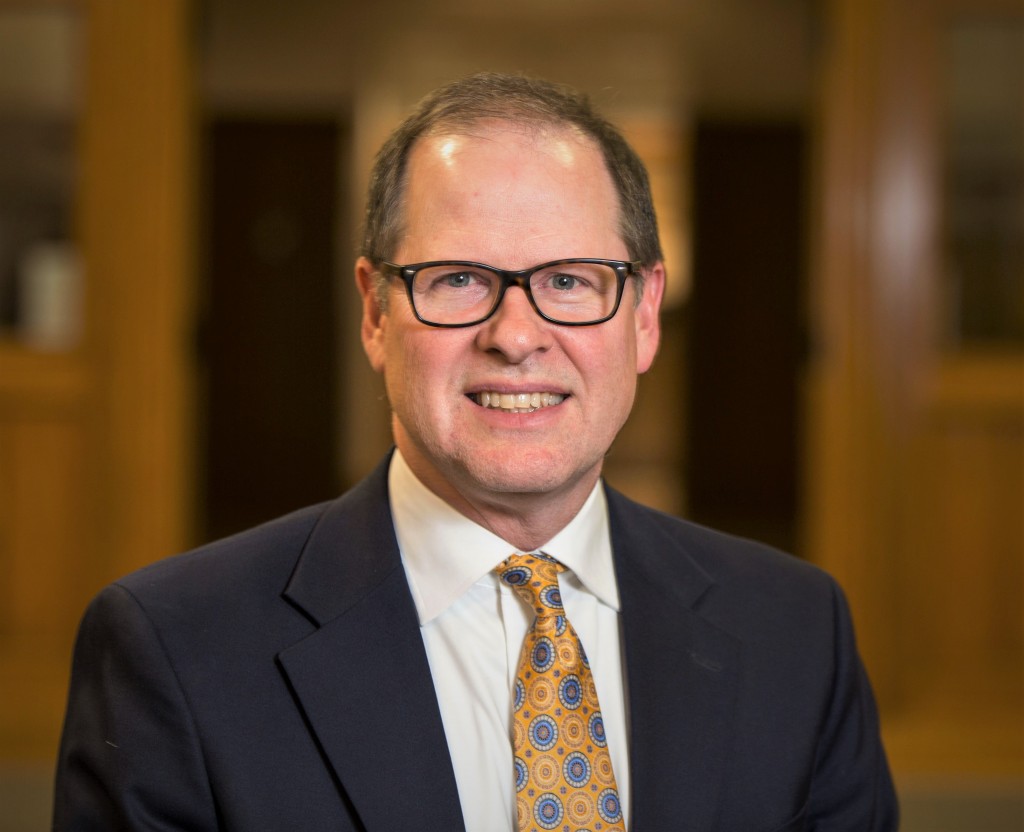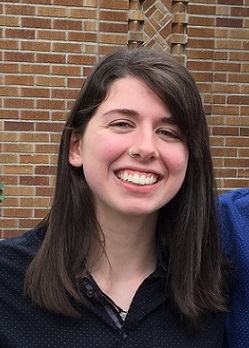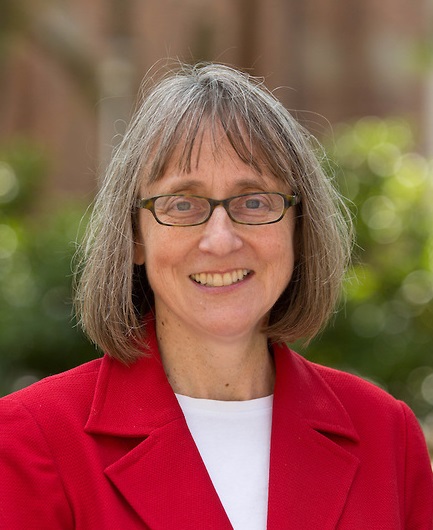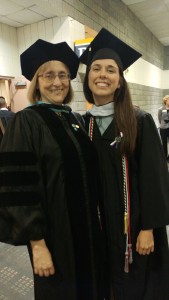Healthcare Economics: An Interview with Teresa Hackler and Karen Travis
By Michael Halvorson, Benson Family Chair in Business and Economic History

The following excerpts were gathered from an April 24, 2018 conversation between Michael Halvorson, PLU student Teresa Hackler, and Economics professor Karen Travis. Hackler and Travis completed a Benson Summer Research project together in 2017 on healthcare economics and racial discrimination in Oregon.
In December, 2017, Teresa Hackler graduated from PLU with a History degree. Since then, she has presented her research in several venues, including the 2018 National Conference for Undergraduate Research in Oklahoma (April).
Karen Travis is an Associate Professor at PLU and serves as Chair of the Economics Department. Her research focuses on the economics of health care access.
Research Goals
Halvorson: “Good morning, Teresa and Karen! Thank you for sitting down with me and letting our blog readers know how your summer and fall research went.”
“As you know, these projects are designed to investigate important aspects of U.S. business and economic history.”
“Your project relates to health care access in the Pacific Northwest, which I find fascinating. Can you begin by describing it for us, Teresa?”
Hackler: “Yes, certainly! My summer research project focused on the history of racial discrimination directed against black residents of Multnomah County, Oregon from 1940-1960.”
“Dr. Travis and I wanted to dig a bit deeper into an often-untaught element of the history of Oregon: until 1926, it was illegal through their constitution for a black resident to actually be living within the state.”
“We wanted to take what we learned about economic opportunity and health outcomes of the first big waves of black migrants to the state and consider what sorts of health implications this has on black residents in Oregon today.”
Approach
Halvorson: “Interesting! Teresa, can you tell us how Dr. Travis helped you with this project?”
Hackler: “I could not have done this work without Dr. Travis’ constant support, energy and instruction.”
“Dr. Travis and I met for months before the summer began, sharing articles and books we found pertaining to our topic and meeting biweekly to discuss new findings. During the summer, she braved several of the six trips to Salem, Oregon with me to record information from over 400 death records of black and white residents from 1940, 1950, and 1960.”
“Her support was absolutely crucial once we began running different data analyses on information we collected as she was able to both suggest other tests to run while also ensuring I was performing the math properly.”
“Finally, Dr. Travis’s expertise in Economics enabled us to consider deeply how a variety of factors might have impacted black health indicators.”
Halvorson: “Dr. Travis, how did you and Teresa work together on this project?”
Travis: “It was a fantastic experience for me to work with Teresa on this project. As an economist, I have not ever worked with data collected from primary sources, so it was extremely valuable to work with a history major!”
“In our travel together to the Oregon State Archives, it was fascinating to jointly consider how to record information and make decisions about what would be relevant as a team.”
“Teresa’s passion for the subject was definitely contagious as well. It was a privilege for me to work with her, and the experience was enriching to my own professional growth into the historical basis for health inequality today.”
Is Research Fun?
Halvorson: “I can tell that this project worked well for you both. Teresa, is research with Dr. Travis really as much fun as it looks like? You two seem to have enjoyed your time working together.”
Hackler: “Yes! I firmly believe that I gained both a mentor and a friend in this process.”
“From the start, we were both so passionate about this research and that enthusiasm truly never waned. Dr. Travis’ excitement every time I shared a new piece of discovered information (even if it was through a text message at 9 pm!) brought me so much joy throughout the entire research period.”
“On top of this, we discovered that we have a whole variety of similarities, most notably including an affinity for coffee, podcasts, and cult documentaries!”
“I cannot urge PLU students enough to take a class with Dr. Travis if they have the opportunity to do so. Not only does she pour her heart into every student that she works with, but she is also hilarious!”
Studying Healthcare Access
Halvorson: “Dr. Travis, can you discuss the other type of research that you do? Or how this research fits into your teaching at PLU?”
Travis: “My research has generally focused the economics of health care access. I’ve published on how physician payment and insurance structures have led to differential access for patients. One of these papers focused on prenatal care and another on inpatient psychiatric care; however, the overriding theme is how various groups have been adversely affected by the economic incentives facing providers.”
“Recently, I wrote a book chapter on health care and the middle class, and I am currently writing another on health care inequality in access. This work with Teresa really helped me to consider how access to care has changed over time and the importance of understanding its historical roots.”
Presenting in Oklahoma
Halvorson: “Teresa, you have presented the results of your research now in several places. Can you describe your most recent presentation in Oklahoma City? What was that like?”
Hackler: “Sure! I am so grateful to have been able to attend the 2018 National Conference for Undergraduate Research this year in Oklahoma. First of all, it was an awesome experience to be able to listen to a variety of presentations across disciplines from students around the country. This aspect of the conference was extremely rewarding as it enabled me to connect with both professors and like-minded students across the nation.”
“Additionally, having another opportunity to present my own research was exciting. Being last in my session, I was not expecting very many people to show up to listen to my presentation. However, to my surprise, several people came in right before I started. I later learned that many of them were students from Oregon who wanted to learn more of their own state’s history.”
“After presenting, I had the chance to take several questions from students and professors of differing backgrounds in the room. I cannot stress enough the importance of being able to approach a problem from every angle, and I felt blessed that this conference gave me the opportunity to think about aspects of my own research from lenses with which I am not as familiar.”

PLU Economics students at the National Conference for Undergraduate Research in Oklahoma City, Oklahoma (April, 2018)
Benson Summer Research Fellowships
Halvorson: “Dr. Travis, what value do you place on the Benson Research Fellowships? How does it help PLU and its students?”
Travis: “Without this fellowship, I would not have considered investigating information from historical death records that are only available in paper form. Without these resources, if Teresa and I were able to work together at all, we would have been forced to simplify our work to only use what is available online.”
“However, it is the materials in paper archives that can lead us to explore new topics. Too little has been published on the disparity between people of color and the white population in the Pacific Northwest, and through this fellowship program, we were able to dive into this important area of research. In addition, the experience was highly engaging for both of us, and I think we both learned a great deal!”
Life After PLU (!)
Halvorson: “Teresa, what are your plans for after PLU?”
Hackler: “I am taking a year or so to work and save money, and then I am hoping to apply to graduate school in Public Health. I am currently waiting on training to become a state health insurance benefits adviser while also working as a CNA. I am excited about a career in culturally sensitive, community-based health initiatives. I love the idea of combining how the history of unique populations intertwines with modern approaches to providing the safest, most effective healthcare.”
Halvorson: “I’ve really enjoyed working with you two. As administrator of the Benson fellowship program, I get to see how many lives you touch with your research, and how much synergy a faculty-research project like this can creates Thanks for your hard work on this. As we wrap up, is there anything else that you would like to say?”
Travis: “I am grateful to the Benson Fellow program for this opportunity to expand my research and work with such an outstanding student. I am also grateful that I had this opportunity to work with Teresa on this project, as she is such a delight. I am proud of her hard work and her final project!”
Hackler: “I would just like to say, once again, how incredibly indebted I am to PLU for providing me with the resources to perform faculty-student research and continue to pursue my vocation!”
Benson Summer Fellows conduct research during the summer and fall months and then present their findings to the PLU community. For more information about the fellowship program and the work accomplished by the current Benson fellows, please email halvormj@plu.edu.





